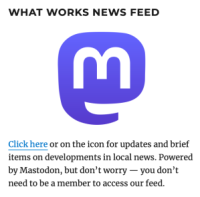
Walt Mossberg, right, has had it with Elon Musk, but he apparently has no problem with Mark Zuckerberg, left. That’s Kara Swisher in the middle. Photo (cc) 2012 by Joe Hall.
On Thursday, I posted an opinion about the newly enacted Massachusetts tax cut on X/Twitter and its three main competitors — Mastodon, Threads and Bluesky. I did it in part simply because I wanted to make a comment, but I also was experimenting. Here’s the post on Threads:
Why are our local media united in referring to the Mass. tax cuts as “tax relief”? It’s an unnecessary package, mainly skewed toward the rich, that will offset the ballot question we just passed to try to meet some real needs in schools, transportation and social services.
Twitter and Mastodon support hashtags, so on those platforms I changed Massachusetts to #MaPoli in the hopes that it would get picked up in those communities. And here’s what I found: As of this morning, I’ve gotten 11 likes and three replies on Threads; 10 likes, four reposts and one reply on Bluesky; eight likes, six reposts and one reply on Mastodon; and 213 likes, 60 reposts and 20 replies on Twitter, including a worthwhile back-and-forth with Matt Szafranski, a lawyer who’s the editor-in-chief of Western Mass Politics & Insight, on whether state officials will be able to grab revenues from the new millionaire’s tax to fund needs other than education and transportation, as the law specifies.
Now, you might say, what’s the big deal? Aren’t we past worrying about engagement on social media? Well, yes and no. Performative tweeting has gotten many people in trouble, including me. But in this case I wanted to express an opinion that would be seen by people in the Massachusetts media and political community, and I knew Twitter would be the best outlet.
Ever since Elon Musk bought Twitter a year ago and took a wrecking ball to it, there’s been a lot of what you might call Twitter-shaming — castigating anyone who continues to use Twitter on the grounds that by doing so you’re enabling Musk and his sociopathic attacks on transgender people and anyone else with the misfortune to cross his radar. For instance, he recently amplified hateful attacks on a reporter for the Las Vegas because he literally had no idea what had really happened, as Angela Fu recently reported for Poynter Online.
I went completely silent on Twitter for several months after Musk bought it and invested quite a bit of time in Mastodon, which is a lovely little community whose members include few of the political, media and local news accounts I need to follow for my professional and academic work. I find more of a political and media presence on Threads and Bluesky but very little of the #MaPoli crowd and virtually none of the people and organizations that are tracking the future of community journalism.
The Twitter-shaming, though, continues. Retired Wall Street Journal tech columnist Walt Mossberg, who only left Twitter a month ago, posted this on Threads Friday:
The reason to quit Twitter (X) isn’t that it’s apparently collapsing financially, or killing important features. It’s a moral and ethical issue. Not only are Nazis, racists, antisemites, misogynists, liars and conspiracy theorists being welcomed back, but the owner seems to be actively supporting this. I gave up a 16-year account with over 800,000 followers because I couldn’t associate myself with this haven for hate and lies. You should too.
Well, good for you, Walt. By the way, you posted that on a platform controlled by Mark Zuckerberg, who has not exactly covered himself in glory with regard to clamping down on election disinformation and enabling genocide. There are also those who criticize anyone who publishes on Substack because that platform has become a home to some sleazy right-wingers (let’s not forget that the great Heather Cox Richardson writes her newsletter on Substack) or who uses Bluesky because Twitter co-founder Jack Dorsey, who has his own issues, is a member of the board.
I’m actively rooting for Musk to drive Twitter into the ground and kill it off once and for all. Until he does, though, I’m going to use it — not as much as I used to, and more carefully than I did in the past. But though Musk is the worst of the worst, the reality is that most of our tech platforms are controlled by dubious characters, and there’s not much we can do about it.



 Elon Musk may have finally flown too close to the sun. The Washington Post on Thursday published an excerpt from
Elon Musk may have finally flown too close to the sun. The Washington Post on Thursday published an excerpt from 




